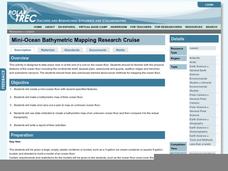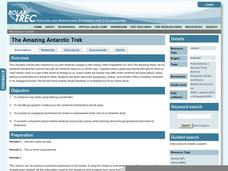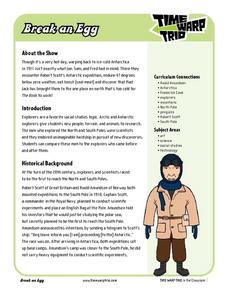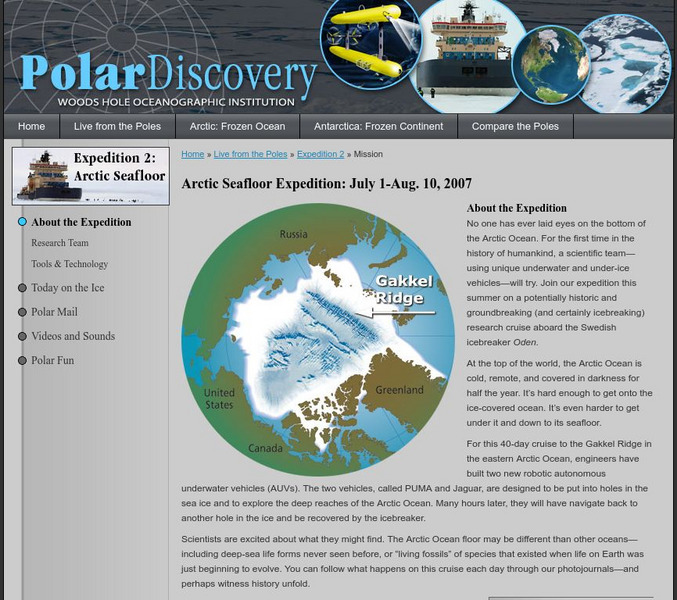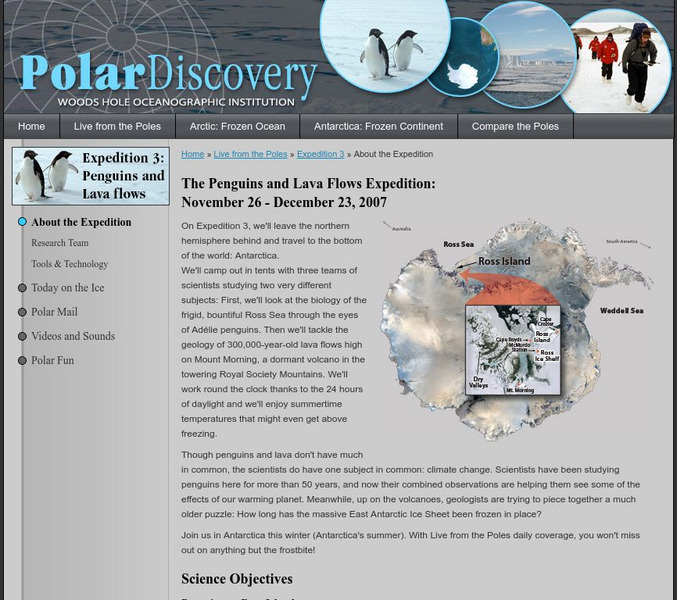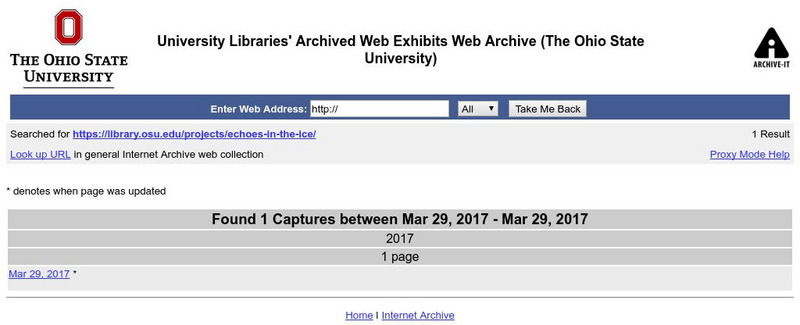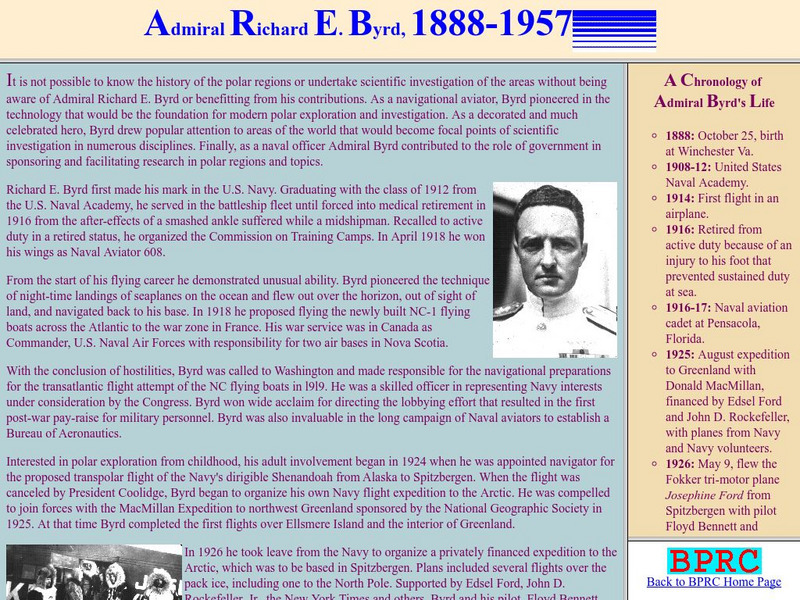Polar Trec
Mini-Ocean Bathymetric Mapping Research Cruise
Middle or high schoolers transform into oceanographers in a week-long simulation. To begin, each group follows directions to create a model of the ocean floor with specified features. Next, the groups prepare to set sail on a research...
Polar Trec
The Amazing Antarctic Trek
This resource provides two ways to engage learners in using latitude, longitude, and research skills. In pairs, or on their own, learners will locate several Antarctic regions on a map. They will write the name of the place and a few key...
Curated OER
Plankton Parade
Plankton isn't just a tiny cartoon character, it's also a very important food source for animals around the world. Budding scientists discuss the types and functions of plankton, including where they are found, how they are caught, and...
NOAA
Ocean Zones
How can organisms light up in water? Bioluminescence is light produced in a chemical reaction that can occur in an organism's body. First, learners determine what happens to light/color as you move into the deep ocean. In groups, they...
American Museum of Natural History
Field Trip Mars
Fly around the Martian surface. Pupils view a presentation on the planet Mars featuring a flyover that shows different views of the surface where rovers have landed and explored on different missions. As individuals watch the images, the...
Curated OER
Exploring Maps: Lesson 2 Guide: Navigation
Students explore and examine how maps have been used in navigation. They research how travelers collected observations to keep track of their positions and plotted information on maps. Each student then makes a Mercator projection...
Curated OER
Break an Egg
Young scholars research antarctic wildlife and create a diorama and fact sheet to present their research to the class. They create an Antarctic explorer's journal.
Curated OER
Exploring Alaska's Seamounts - Volcanoes, Plates, and Chains
Students examine the formation of seamounts in the Gulf of Alaska. In this seamount instructional activity, student focus on how the Axial-Cobb-Eikelberg-Patton chain was formed. They learn the associated vocabulary, and watch a teacher...
Woods Hole Oceanographic Institution
Polar Discovery: Arctic Seafloor Expedition: July 1 Aug. 10, 2007
This polar expedition to study the Arctic seafloor took place in 2007, but you can still enjoy following the footsteps of these scientists. The goal of the expedition was to see if there were active hydrothermal vents on the ocean...
Woods Hole Oceanographic Institution
Polar Discovery: The Greenland Glacier Expedition: July 7 July 24, 2008
This polar expedition took place in 2008, but you can still experience the thrill of following these scientists as they engage in research studying the changes in Greenland's ice sheet. Meet the research team and learn about the...
Other
Salariya: You Wouldn't Want to Be a Polar Explorer!
This site talks about the "Expedition you'd rather not go on." Click through this great on-line cartoon book to learn about Shackleton's polar expedition.
Other
Usps: Polar Lights
You and your students are going on an expedition to learn about the polar regions. Explore the glaciers, subglacial rivers, and volcanoes. Get up close and personal with furry, flippered, and feathered friends. Learn how other people...
Woods Hole Oceanographic Institution
Polar Discovery: Live From the Poles: Exp 3: The Penguins and Lava Flows
Travel on an expedition to Antarctica to see the Ross Sea through the eyes of Adelie penguins, and then discover the geology of 300,000-year-old lava flows high on Mount Morning.
American Museum of Natural History
American Museum of Natural History: The Endurance
Learn about Ernest Shackleton's ill-fated voyage to Antarctica aboard the "Endurance" and about the amazing rescue that followed, after the expedition was forced to abandon ship. Uses actual expedition photographs and diary entries to...
Carnegie Museum of Natural History
Carnegie Museum of Natural History: Needle to the North
Online exhibit explores Arctic expeditions of the twentieth-century via the photos and field notes of researchers who experienced the "alien landscape rife with cold, darkness, and isolation."
American Museum of Natural History
American Museum of Natural History: Race to the End of the Earth
Multimedia-rich exhibition documents the race, in 1911, to be the first to reach the South Pole. Two teams undertook the perilous journey, one British, led by Robert Scott, and one Norwegian, led by Roald Amundsen. With digital dioramas,...
Ohio State University
Echoes in the Ice: Exploration and Science in Antarctica
A website about Richard E. Byrd, Dr. Frederick A. Cook, and Sir Hubert Wilkins and Antarctica exploration.
Ohio State University
Ohio State University: Admiral Richard E. Byrd
This concise site contains a brief history of Byrd's life along with an easy to read chronology of major events in his life.
Curated OER
Educational Technology Clearinghouse: Maps Etc: North America, 1858
A map from 1858 of North America showing the boundaries at the time for Russian America (Alaska), Greenland, British America or New Britain, Canada East and Canada West, the United States, Mexico, Central America, and the West Indies...


